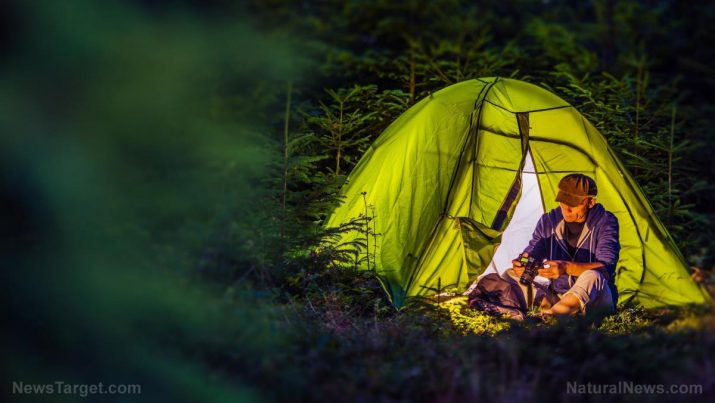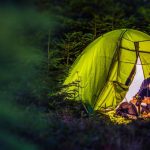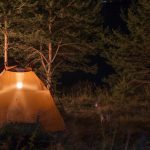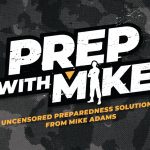
Survival basics: How to protect your camp from 4 different kinds of trespassers
Wednesday, October 12, 2022 by Zoey Sky
http://www.naturalnewstips.com/2022-10-12-survival-protect-your-camp-4-invasive-trespassers.html

You need to know how to protect yourself and your family from various threats like pesky bugs and pets, wild animals, other humans and natural disasters when doing outdoor activities or bugging out after SHTF.
If you are prepared and know how to use the right gear and equipment, you can survive these threats along with other obstacles like natural disasters. (h/t to PreppersWill.com)
Pesky bugs and pests
Many bugs and pests simply cause discomfort, but there are others that can spread life-threatening infections and diseases.
Sleeping outdoors means you may be exposed to mosquitoes and flies that can keep you up at night. This means you might not get enough sleep, especially if you spend the whole night scratching and swatting at these pesky insects.
When you are deprived of good sleep, your mental and physical capacities will be severely impaired the following day. In a survival scenario, this can affect your decision-making skills. A lack of sleep can decrease your basic motor skills.
You can prevent these issues by bringing bug repellent and outfitting your tent, hammock or sleeping bag with mosquito netting. Once you’re protected against these pests, you can get a good night’s sleep.
For ground-dwelling insects, mark out a square section of land for your camp and set fire to the ground-level leaves for a controlled burn. Do this when it isn’t windy to avoid starting a fire at your campsite.
The controlled burn will help get rid of pests like mites, spiders and ticks where you choose to pitch your tent. Burning a small area of your campsite will also help temporarily warm up the freezing ground during fall or winter.
Alternatively, you can escape ground-dwelling bugs by sleeping on a raised tent or hammock.
Avoid bees by looking out for nests in the neighboring trees. Don’t rustle trees if you spot a nest while setting up camp because this may disturb the colony.
Head for cover if you are attacked by a swarm of bees. If you can’t find any shelter, cover your body with a tarp or jacket until the bees disperse and depart the area.
Real life is nothing like the movies so don’t jump into a lake or river. Bees are patient and they might just wait for you to resurface before stinging you.
If you get stung by bees, remove the stingers immediately. To reduce the pain caused by the sting, apply an ice cube or a cold compress. You can also take pain medication orally.
If the bee sting causes itching, take antihistamines. However, they can cause drowsiness so make sure you have someone else to watch over you.
If you are having trouble swallowing or if the affected area expands or becomes infected, consult a doctor as soon as possible. And if you have a known allergy to bee stings, bring your allergy medication when bugging out.
Wild animals
Bears are persistent and their sense of smell is so acute they may discover potential food sources up to 20 miles away. This means your leftovers could attract bears to your camp unless you store your food properly.
If you are going to pass through grizzly country, make sure you travel with a group. A group of three or more people is less likely to have trouble with bears since you will make more noise than one or two hikers.
Avoid hiking in the early morning or evening hours in grizzly country because bears are often crepuscular or nocturnal in habits, especially in areas with moderate or heavy human presence.
Watch out for bear signs such as:
- Clawed or rubbed tree bark, sometimes with brownish or silvery hair attached
- Scat
- Torn-open logs or diggings where grizzlies have foraged for roots, insects or rodents
- Tracks
Be wary if you see bear signs, especially those that look or smell fresh. You should leave the area if there has been a lot of recent bear activity.
Grizzly bears often rest close to a carcass or even on top of it, so it’s wise to assume a bear may be close by.
Avoid bears by taking precautionary measures. Find out what attracts them first, and then store food properly to prevent bear attacks.
Aside from human food, bears are attracted to pet food, bird seed, cooking vessels, cosmetics, hand lotions, toothpaste and even unopened soda. When camping, store these items in a bear-resistant storage box elevated at least 10 feet or higher above the ground.
Leave at least five feet of space between vertical supports in the box. If you have a car nearby, store food in the trunk.
Bears can easily tear through tents, plastic coolers, Styrofoam, or thin-walled campers. These items provide little protection against a bear’s hunger.
Don’t cook near your sleeping spot, especially when camping deep in the woods. Allow at least 50 to 100 yards between your cooking area and your tent. Bears can also smell snacks, so don’t hide food in your tent if you don’t want to attract bears.
If a bear stumbles upon your campsite, decrease engagement with it and convince it to go on its way. It’s best to use bear spray, which is similar to pepper spray used for self-defense against humans.
Bear spray is usually successful at stopping a charging or attacking bear so always have it close by. You can also scare away a curious bear with an air horn, a strong flashlight or a pistol.
Leftovers may also attract raccoons. They look cute, but raccoons may have rabies, so avoid them if possible.
Raccoons hate the smell of chili peppers so you can scatter cayenne pepper around your campground to keep them away. Cayenne can also keep out small creatures like squirrels.
Spread the cayenne pepper every few days after rain. While a raccoon bite isn’t fatal, the danger of rabies exposure is.
If you think you have been bitten by a rabid raccoon, clean the wound thoroughly with antiseptic soap and water immediately and call emergency services.
If the animal was rabid, your chances of survival are better the sooner you get medical help. If it’s safe to do so, someone else can try capturing the animal to help confirm if it does have rabies.
You can deter other small animals by making loud noises. When the animals come very close, use air horns, shout or clap loudly to scare them away.
Other humans
When SHTF, other people may attempt to trespass on your campsite. People may get more desperate if they are facing societal or economic collapse or after a natural or man-made disaster
These tips are not always applicable to a typical outdoor camping vacation.
After disaster strikes and you have to bug out, other people may target your supplies, especially if you have food and clean drinking water. While they may have a valid reason to steal from you, you don’t have to let it happen or be a sitting duck.
Protect yourself and your family by making sure you set up camp at the right location. Don’t stay along a well-traveled trail.
Choose a location away from the beaten path and into an “uncharted” section of the woods. While this makes the route to your destination more difficult and time-consuming, you are more secluded and therefore safer from looters.
You should also try to camouflage your campsite. Try to fit in with your surroundings.
If you’re camping in the woods, drape camouflage tarps or tents. If you’re stuck with a brightly colored tent, hide it with a camo cover to hide it among the foliage.
If or when others invade your campsite, you must be prepared to defend yourself with a firearm, knife or blunt weapon. If attackers threaten your life or your loved ones, do whatever you can to protect everyone.
Natural disasters
When SHTF, you may also face another terrifying and tireless threat: a natural disaster. If you are unprepared, a natural disaster may destroy your campsite and leave you injured or dead. (Related: Camping safety tips: 6 Ways to stay cool in summer.)
Depending on the location, you may experience torrential rain, which can cause flash floods. You may also face sleet, snow or strong winds.
Fortunately, you can prepare for these natural threats by making sure you have the necessary supplies. Keep in mind that nature should never be underestimated.
When bugging out in areas prone to strong rainstorms, avoid setting up camp too close to a river’s side. Flash flooding can cause fast-moving rivers to form in locations that you thought were above the waterline.
If you’re lucky enough to survive a flash flood, you could still lose your gear and supplies, which may make outdoor survival much harder.
Even if your campsite is quiet, remember that you are not completely alone. Invaders motivated by hunger or curiosity may pose a threat, so you should learn how to protect yourself and your family against bugs, wild predators, or other humans.
Watch the video below for 20 useful wilderness survival tips.
This video is from the SHTFPrepping101 channel on Brighteon.com.
More related stories:
Prepping 101: What is situational awareness and why is it crucial for your personal safety.
10 Must-have camping tools that can teach your kids survival skills.
Essential supplies to pack in your first aid kit for a camping trip.
Sources include:
Tagged Under: Tags: bugging out, camping, natural disasters, off grid, pests, preparedness, prepper, prepping, self-defense, SHTF, survival, Survival Tips, wild animals
RECENT ARTICLES


Survival basics: How to protect your camp from 4 different kinds of trespassers
By Zoey Sky

Prepper medicine: How to make herbal cough syrup
By Zoey Sky

Common (and not-so-common) camping and bug out mistakes and how to avoid them
By Zoey Sky

PrepWithMike: How to make paint can heater for heating and off-grid cooking
By Kevin Hughes
COPYRIGHT © 2017 NATURAL NEWS TIPS


